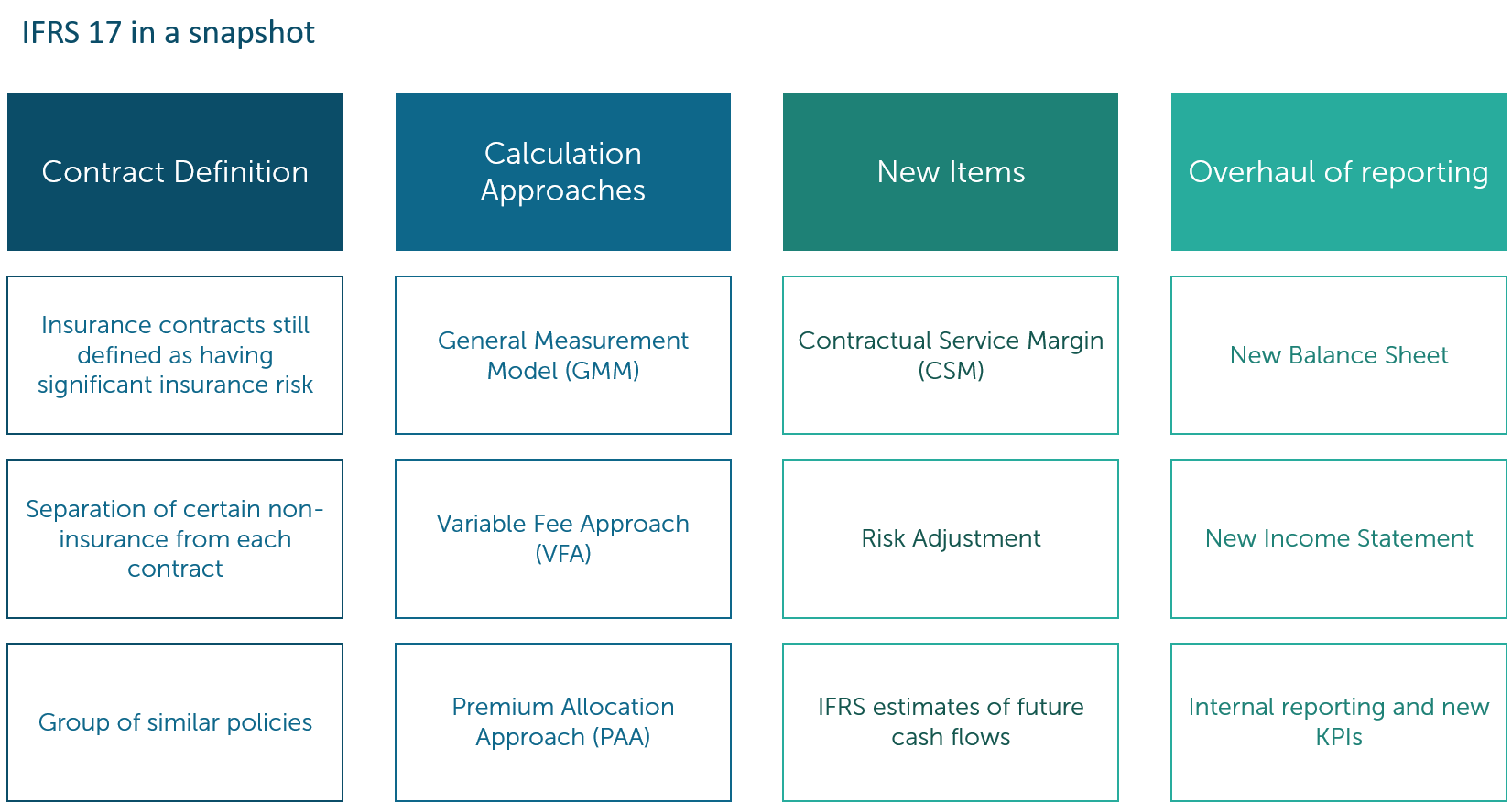Related Articles
How Finalyse can help
IFRS 17 implementation
IFRS 17 will apply as from 1 January 2023. Depending on which stage of the IFRS 17 implementation process you are, Finalyse can help you with the gap analysis, the proof of concept, the development of the right tools and processes to meet the target operating model, your impact analysis, the parallel runs and the go-live launch.
The new accounting standard changes the recognition, measurement, presentation and disclosure of insurance contracts. It directly impacts how insurers value their insurance liabilities on their balance sheet and how they recognise profits in their Income Statement.
How does Finalyse address your challenges?
We define business, functional, and technical requirements
We facilitate coordination between functions such as Finance, Actuarial and IT in the process of accounting systems upgrading
We design and test use cases, and deploy parallel and dry runs
We help insurers select the right risk mitigation techniques and ALM strategies to reduce IFRS 17’s Income Statement and Balance Sheet volatility
We help you select your target operating model / IT tool
We offer parallel implementation of IFRS 17 and IFRS 9
How does it work in practice?

We have a team of IFRS 17 subject matter experts, including actuaries, and a dedicated competency centre with significant hands-on experience in the development and implementation of target operating models for all aspects of financial reporting, including the integration of actuarial and accounting processes as well as the data management and quality processes.
Key Features
- Leverage on our experience in areas beyond financial reporting, such as actuarial models, IT systems including data management and storage capacities, risk management including ALM and hedging, product design, business strategies and remuneration.
- IFRS 17 is a principle-based standard, and as such, it is subject to interpretation in several areas. Additionally, it provides for a number of options to be selected by insurers from day one. It is, therefore, important that combinations of options and approaches are tested against carefully defined insurance and economic scenarios before taking any final decisions.
- With the temporary exemption from IFRS 9 for insurers, you can bring the two standards into line and apply them together as from January 2023. Finalyse offers its experience in the parallel implementation of both standards.

Francis is a Principal Consultant in charge of our insurance practice in Dublin. He has 15 years of experience within the life and non-life (re)insurance industry. His expertise covers the areas of financial reporting, prudential regulation, and actuarial modelling. Francis has worked in both industry and consulting with extensive exposure to Solvency II and BMA-regulated clients and a keen eye on new regulatory developments.

Divyank is a Senior Consultant with more than 8 years of experience and a part qualified Actuary. He has acquired expertise in Solvency II, IFRS17 and MCEV reporting and has worked for life and non-life business. He has extensive experience in Prophet modelling, DCS, statutory valuation and IFRS17 implementation and his coding skills include Prophet and DCS modelling, SAS, VBA, R.
Finalyse InsuranceFinalyse offers specialized consulting for insurance and pension sectors, focusing on risk management, actuarial modeling, and regulatory compliance. Their services include Solvency II support, IFRS 17 implementation, and climate risk assessments, ensuring robust frameworks and regulatory alignment for institutions. |

Our Insurance Services
Check out Finalyse Insurance services list that could help your business.
Our Insurance Leaders
Get to know the people behind our services, feel free to ask them any questions.
Client Cases
Read Finalyse client cases regarding our insurance service offer.
Insurance blog articles
Read Finalyse blog articles regarding our insurance service offer.
Trending Services
BMA Regulations
Designed to meet regulatory and strategic requirements of the Actuarial and Risk department
Solvency II
Designed to meet regulatory and strategic requirements of the Actuarial and Risk department.
Outsourced Function Services
Designed to provide cost-efficient and independent assurance to insurance and reinsurance undertakings
Finalyse BankingFinalyse leverages 35+ years of banking expertise to guide you through regulatory challenges with tailored risk solutions. |

Trending Services
AI Fairness Assessment
Designed to help your Risk Management (Validation/AI Team) department in complying with EU AI Act regulatory requirements
CRR3 Validation Toolkit
A tool for banks to validate the implementation of RWA calculations and be better prepared for CRR3 in 2025
FRTB
In 2025, FRTB will become the European norm for Pillar I market risk. Enhanced reporting requirements will also kick in at the start of the year. Are you on track?
Finalyse ValuationValuing complex products is both costly and demanding, requiring quality data, advanced models, and expert support. Finalyse Valuation Services are tailored to client needs, ensuring transparency and ongoing collaboration. Our experts analyse and reconcile counterparty prices to explain and document any differences. |

Trending Services
Independent valuation of OTC and structured products
Helping clients to reconcile price disputes
Value at Risk (VaR) Calculation Service
Save time reviewing the reports instead of producing them yourself
EMIR and SFTR Reporting Services
Helping institutions to cope with reporting-related requirements
CONSENSUS DATA
Be confident about your derivative values with holistic market data at hand
Finalyse PublicationsDiscover Finalyse writings, written for you by our experienced consultants, read whitepapers, our RegBrief and blog articles to stay ahead of the trends in the Banking, Insurance and Managed Services world |

Blog
Finalyse’s take on risk-mitigation techniques and the regulatory requirements that they address
Regulatory Brief
A regularly updated catalogue of key financial policy changes, focusing on risk management, reporting, governance, accounting, and trading
Materials
Read Finalyse whitepapers and research materials on trending subjects
Latest Blog Articles
Contents of a Recovery Plan: What European Insurers Can Learn From the Irish Experience (Part 2 of 2)
Contents of a Recovery Plan: What European Insurers Can Learn From the Irish Experience (Part 1 of 2)
Rethinking 'Risk-Free': Managing the Hidden Risks in Long- and Short-Term Insurance Liabilities
About FinalyseOur aim is to support our clients incorporating changes and innovations in valuation, risk and compliance. We share the ambition to contribute to a sustainable and resilient financial system. Facing these extraordinary challenges is what drives us every day. |

Finalyse CareersUnlock your potential with Finalyse: as risk management pioneers with over 35 years of experience, we provide advisory services and empower clients in making informed decisions. Our mission is to support them in adapting to changes and innovations, contributing to a sustainable and resilient financial system. |

Our Team
Get to know our diverse and multicultural teams, committed to bring new ideas
Why Finalyse
We combine growing fintech expertise, ownership, and a passion for tailored solutions to make a real impact
Career Path
Discover our three business lines and the expert teams delivering smart, reliable support


